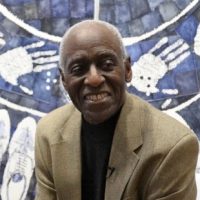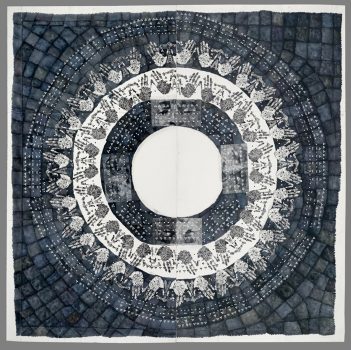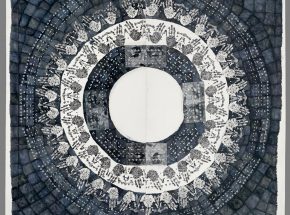

Richard Foster Yarde was born in the Roxbury neighborhood of Boston to emigrant parents from Barbados, West Indies. He attended the Boston Public Schools and graduated from Boston University where he received both a BFA cum laude and an MFA degree. As a teacher, he has trained generations of young artists. Since 1990, he has been a Professor of Fine Art at the University of Massachusetts at Amherst. He lives in Northampton, Massachusetts.
Richard Yarde is one of America’s great watercolorists. His work is highly regarded and has earned wide critical acclaim for its signature use of compositional grids of irregular rectangles, brilliant color and racial pride. He has received awards from the National Endowment for the Arts, the National Academy of Design, the Massachusetts Commonwealth Award for Fine Art and an Academy Award from the American Academy of Arts and Letters.
Yarde tackles the difficult, ‘traditionally intimate art of watercolor, and paints on a heroic scale with dazzling color, rich symbols and deeply evocative imagery. Critics have written, and Yarde concurs that his body of work has been an exploration of his own personal history. Thus, paintings from his Ring Shout Series are inspired by a sacred, healing ceremony that also enhanced community solidarity. The Ring Shout was performed as a circle dance by African Americans during the slave era and continues into the present. As such, the painting entitled Pulse represents a transformational spiritual journey that is equally personal and collective.
Richard Yarde’s paintings are in private collections throughout the country and have been exhibited at the Anacostia Museum and Center for African American Art, Fisk University, Morris Brown Gallery (Atlanta), Hampton Museum of Art, and the National Center of African American Artists, et al. His paintings reside permanently in nearly three dozen public collections including the Metropolitan Museum of Art and The Studio Museum of Art in New York City, the Museum of Fine Arts in Boston, the Museum of Fine Arts in Houston, the Herbert F. Johnson Museum of Art at Cornell University, and the National Museum of American Art, Smithsonian Institution, Washington DC.

